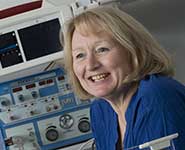The first use of xenon gas and cooling in treating babies deprived of oxygen at birth took place at St Michael’s Hospital in Bristol in 2010, but new technology now means that it can be delivered to babies while they are being transferred to St Michael’s Hospital as part of a clinical trial.
The pioneering technique of delivering cooling and xenon gas to babies has been developed by Marianne Thoresen, Professor of Neonatal Neuroscience at the University of Bristol's School of Clinical Sciences and Dr John Dingley, Consultant Anaesthetist and Reader in Anaesthetics at Swansea University’s College of Medicine. This trial is being funded by the J P Moulton Charitable Foundation and SPARKS (Sport Aiding Medical Research for Kids).
In the UK, every year, more than 1,000 otherwise healthy babies born at full term die or suffer brain injury caused by a lack of oxygen and/or blood supply at birth. This can lead to lifelong problems such as cerebral palsy.
Poppy Laker was the second baby in the world to receive xenon while being transferred between hospitals. When she was born at the Royal United Hospital in Bath she was not breathing and needed to be resuscitated. Her parents were told about the xenon trial and decided within 30 minutes to give permission for Poppy to have the treatment. Parents Stephen and Kelly Laker from Somerset said that the baby was doing well and has been taken off the ventilator and all medication and now simply has a feeding tube to help her eat.
Professor Marianne Thoresen said: "Xenon is a very rare and chemically inert anaesthetic gas found in tiny quantities in the air that we breathe. In 2002 Dr John Dingley and I realised the potential xenon and cooling might have in combination to further reduce disability. Over the past eight years, we have shown in the laboratory that xenon doubles the protective effect of cooling on the brain.
"Previously babies would need to come to us at St Michael’s Hospital to have xenon gas treatment started, but we believe it is essential to start the xenon therapy as soon as possible after birth. As we work as part of a network, babies can come to us from Taunton to Swindon to Gloucester and often babies can’t get back to us within five hours to start the treatment.
"Now, Dr Dingley has designed and built the equipment to commence delivery of the xenon to babies while they are still at the referring hospital and then while they are being transferred to St Michael’s Hospital. Hopefully this will mean that more babies will have the opportunity to take part in the trial."
Dr Dingley has been developing equipment in Swansea for xenon anaesthesia in adults and more recently babies for over ten years. His machine takes the exhaled gas, removes waste products from it and re-circulates it to be breathed again without any loss to the outside air.
Dr John Dingley explained: "To reduce delay between birth and treatment it is now common to start cooling therapy during the ambulance transfer and we wanted to do this with the xenon as well. Therefore I developed a very compact version of the xenon breathing system we are using in the baby unit that fits a small space on the ambulance baby transport system so xenon can be delivered to the lungs continuously even while the baby is being moved. The system needs to recirculate all the breathed gases to contain costs as xenon is extremely expensive."
St Michael’s Hospital and the University of Bristol has pioneered new treatments for brain injury in babies since Marianne Thoresen first started cooling babies in 1998, showing that cooling babies after a lack of oxygen could reduce damage in the newborn brain. After her original laboratory work from 1995 showing that cooling after lack of oxygen reduced brain injury in animal models, clinical trials of cooling have now proven that mild cooling by only a few degrees for 72 hours is a safe and beneficial treatment. However, cooling only partially reduces disability and does not prevent it in all babies. The search has been to find a second treatment that could be added to cooling to further reduce disability. From 2010 to 2011, for the first time in the world, fourteen cooled infants at St Michael’s Hospital took part in a study examining whether xenon could be delivered safely and without side effects. This was carried out successfully enabling ethical approval for the current study comparing xenon and cooling with the standard of cooling therapy on its own.
So far, 16 babies have taken part in this randomised controlled trial. Around half of them have had xenon and cooling and the other half the standard cooling therapy. The plan is to recruit 84 babies to the trial, the number predicted to be needed to show a difference between the two groups.
J P Moulton Charitable Trust said: "It is very gratifying to have part funded such exciting work. The team at Bristol are both talented and exceptionally dedicated."
John Shanley, Chief Executive for Sparks, added: "Each year in the UK, over 3,500 babies die before their first birthday. Funding research that helps prevent, diagnose, treat and cure conditions affecting the health of children is at the heart of what Sparks does. We have been committed to funding research into xenon gas and cooling therapy for a number of years, and we are pleased to start seeing the outcomes of the wonderful work being done by Professor Thoresen and her team."
